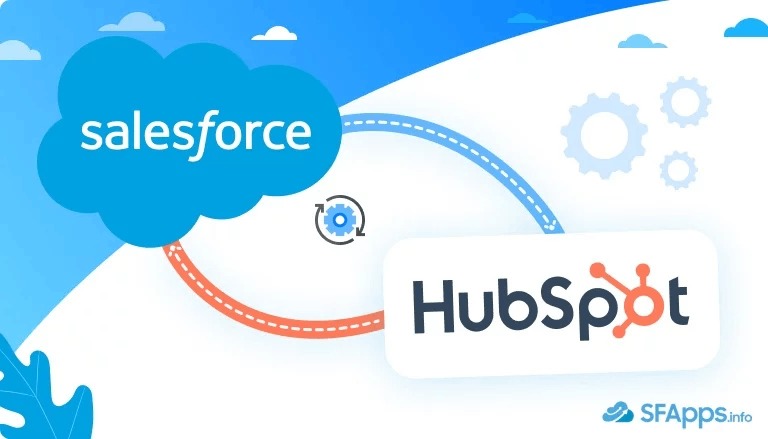Integrating Salesforce with HubSpot can really boost how we manage our business operations and customer relations. First off, the seamless data synchronization between both platforms allows teams to have real-time access to crucial information, cutting down on errors and unnecessary manual work. This integration also improves lead management, ensuring we effectively nurture leads that may not be ready to buy just yet. Plus, with enhanced marketing automation tools available through HubSpot, targeted campaigns become more efficient. Comprehensive analytics will give us insights into our performance while helping streamline communications with customers. All these benefits contribute to increased sales productivity and better understanding of customer needs overall.
1. Seamless Data Synchronization Between Platforms
Integrating Salesforce with HubSpot enables a smooth flow of information between the two systems. This means that when data is updated in one platform, it automatically updates in the other, eliminating the need for manual data entry. For example, if a sales representative updates a lead’s status in Salesforce, that change is immediately reflected in HubSpot, ensuring that marketing teams are always working with the latest information. This real-time synchronization helps reduce errors that often occur with manual data handling, leading to more accurate records. It also fosters better collaboration between sales and marketing teams, as both can rely on the same set of data to strategize and make decisions.
2. Enhanced Lead Management for Better Conversions
Integrating Salesforce with HubSpot transforms how we manage leads, ensuring a smoother journey from initial interest to conversion. This integration allows us to track leads effectively, assigning them to sales reps based on specific criteria such as engagement level or demographic information. For instance, if a lead opens multiple marketing emails but hasn’t yet requested a demo, the system can automatically prioritize that lead for follow-up. Such targeted approaches are essential, especially considering that 50% of leads are qualified but not ready to buy, as reported by Demand Gen. By nurturing these leads through personalized communication and timely follow-ups, we enhance our chances of conversion significantly.
3. Improved Marketing Automation Features
Integrating Salesforce with HubSpot enhances marketing automation significantly. With HubSpot’s tools, you can create tailored campaigns that respond to customer actions captured in Salesforce. For example, if a lead engages with a specific email or visits a product page, you can trigger follow-up emails or personalized offers. This targeted approach not only boosts engagement but also increases the likelihood of conversion. According to a study by Marketo, companies that excel in lead nurturing generate 50% more sales-ready leads at a 33% lower cost. By automating these processes, businesses can save time and resources while delivering timely and relevant content to prospects, ultimately driving more successful outcomes.
- Streamlined workflows across marketing channels
- Automation of repetitive tasks to save time
- Enhanced targeting capabilities for personalized campaigns
- Real-time tracking of marketing efforts for instant feedback
- Integration of AI tools for better decision-making
- Simplified reporting processes for performance analysis
- Better alignment between sales and marketing teams
4. Comprehensive Analytics and Reporting Tools
Integrating Salesforce with HubSpot unlocks powerful analytics and reporting capabilities. By combining data from both platforms, businesses can gain a clear picture of their sales and marketing performance. This integration allows for real-time tracking of metrics such as conversion rates, customer engagement, and campaign effectiveness. For instance, a company can analyze how well a specific email campaign drives leads into the sales funnel, measuring its impact on overall revenue. Companies that leverage analytics effectively are more likely to make informed decisions that drive growth. In fact, studies show that organizations using integrated analytics tools are five times more likely to make better decisions, leading to improved business outcomes.
| Benefit | Statistic | Source |
| Better Decision Making | Organizations that use analytics effectively are 5 times more likely to make better decisions. | Salesforce |
| Performance Tracking | Combined data allows for comprehensive reports showcasing key performance indicators (KPIs). | N/A |
| Sales Growth | Companies that leverage customer insights outperform their competitors by 85% in sales growth. | McKinsey |
5. Streamlined Customer Communication Processes
Integrating Salesforce with HubSpot significantly improves how we communicate with our customers. This integration allows for automated messages and personalized content that can be triggered based on customer actions recorded in Salesforce. For instance, if a customer downloads a whitepaper or engages with a marketing email, HubSpot can automatically send a follow-up email tailored to their interests. This timely communication not only keeps customers engaged but also enhances their overall experience. Research shows that 70% of consumers expect personalized interactions from brands, and this integration helps meet that expectation. By ensuring that our responses are relevant and timely, we can build stronger relationships and foster loyalty among our customers.
6. Increased Sales Productivity for Teams
Integrating Salesforce and HubSpot significantly boosts sales productivity for teams. By automating routine tasks, such as data entry and follow-up reminders, sales representatives can dedicate more time to what truly matters—engaging with potential clients and closing deals. For instance, if a sales rep spends less time updating records or searching for customer information, they can focus on nurturing relationships. Research from Salesforce shows that companies that implement integrated CRM systems experience a 32% increase in sales productivity. This means that each salesperson can potentially close more deals within the same timeframe, ultimately driving higher revenue and better performance for the whole team.
7. Better Customer Insights and Engagement
Integrating Salesforce with HubSpot provides a deeper understanding of customer behavior and preferences. By combining data from both platforms, businesses can gain a comprehensive view of each customer’s journey, from initial contact to final purchase. This insight allows for more effective segmentation and targeted marketing strategies. For example, if a customer frequently engages with content about a specific product, businesses can tailor their follow-up communications to highlight that product, increasing the likelihood of conversion. A study by McKinsey shows that organizations utilizing customer insights see an 85% increase in sales growth compared to their competitors. This level of understanding not only helps in crafting personalized marketing messages but also enhances customer relationships, fostering loyalty and repeat business.
Frequently Asked Questions
1. How does integrating Salesforce and HubSpot help my sales team?
Integrating Salesforce and HubSpot allows your sales team to access valuable customer information from both platforms, making it easier to understand leads and close deals more effectively.
2. What data can be shared between Salesforce and HubSpot?
You can share various data like contacts, leads, opportunities, and summaries of interactions, helping to keep all your information in sync.
3. Will my team need training to use these integrated systems?
While some basic training might be helpful, both Salesforce and HubSpot are user-friendly, so your team can start using the integration efficiently with minimal learning curve.
4. Can I customize how the integration works for my business?
Yes, both Salesforce and HubSpot offer customization options that let you tailor the integration to fit your specific business processes and workflows.
5. How does this integration improve my marketing efforts?
The integration enhances marketing by providing deeper insights into your audience’s behavior, allowing for better targeting and more effective campaigns.
TL;DR Integrating Salesforce and HubSpot offers various benefits that enhance business operations. Key advantages include seamless data synchronization, improved lead management, and robust marketing automation features. This integration also provides comprehensive analytics for better decision-making, streamlines customer communication, boosts sales productivity, and delivers better customer insights. Embracing this integration positions businesses for growth in a competitive landscape.






